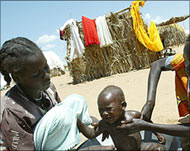Janjawid leader tells of Khartoum links
Sudan’s government in Khartoum directed and supported ethnic Arab militia attacks on ethnic Africans in Darfur, a top militia leader has told Human Rights Watch.

The New York-based human rights group said on Wednesday that Musa Hilal, who has been identified by the US State Department and others as a leader among the Arab militias operating in Darfur, spoke to its researchers last year.
Sudanese government officials repeatedly have rejected allegations they were linked to the Arab militias known as Janjawid.
A Sudanese Foreign Ministry official, who said he had not read the Human Rights Watch report, said on Wednesday that Hilal must have been misquoted.
The Darfur conflict began after two non-Arab rebel groups took up arms against the central government in a bid to win more political and economic rights for the region’s African tribes.
Sudan‘s government denies that it backs the Janjawid militias.
No firm estimate of the direct toll of the war yet exists, but it is thought to be in the thousands.
Orders from Khartoum
In the videotaped interview, Hilal told Human Rights Watch: “All the people in the field are led by top army commanders.”
Hilal, speaking in Arabic, said in the transcript provided by Human Rights Watch: “These people get their orders from the Western command centre, and from Khartoum.”
 |
|
Thousands are thought to have |
The tapes were made over several hours of interviews with Hilal last September in Khartoum. Human Rights Watch said the release of the tape was delayed for technical reasons related to translating Hilal’s comments and formatting the tape.
Since the United States accused the Arab militias of committing genocide, Hilal has been in seclusion in the capital, under close watch by Sudanese officials, those in contact with him say.
Hilal, from the North Darfur town of Mistiria, recruited, trained and armed militia fighters who called themselves the Border Intelligence Division, accused of the bulk of the atrocities reported in Darfur.
That militia also calls itself the Second Reconnaissance Brigade, or the Quick and the Horrible, say officers of the African Union, a 53-nation bloc whose monitors are inspecting compliance with a repeatedly violated ceasefire.
Denial of command
In the Human Rights Watch tape, Hilal confirmed being a recruiter but denied he commanded the militia: “Yes, it’s true, I mobilise people, I coordinate with recruiters … but I was never a commander of troops in a war zone.
“But as for the military units, with guns, that move around to attack rebel areas or that are attacked by rebels – they’re under the order of field commanders,” Hilal said.
|
“We now see that the two parties responsible for crimes against humanity in Darfur are pointing the finger at each other” Peter Takirambudde, executive director, HRW Africa division |
The executive director of Human Rights Watch’s Africa division highlighted Hilal’s denial of command responsibility: “Musa Hilal squarely contradicts the government’s claim that it has ‘no relationship’ with local militias,” Peter Takirambudde said.
“We now see that the two parties responsible for crimes against humanity in Darfur are pointing the finger at each other,” Takirambudde said.
A UN-appointed panel said in February that Sudan’s government and the Janjawid militias were not guilty of genocide but did commit mass killings, torture, rape and other atrocities in the Darfur region that merit trials in the International Criminal Court.
The United States has called on the Sudanese government to do more to end the Darfur conflict, which the United Nations says has created the world’s worst humanitarian crisis.